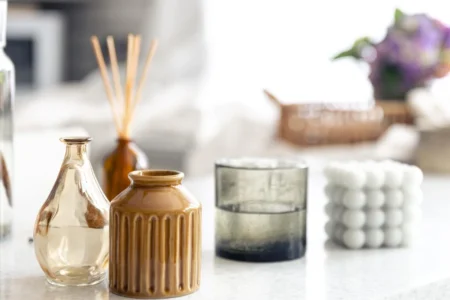 Synthetic scents are ubiquitous in many household products, from air fresheners and candles to laundry detergents and personal care items. While these fragrances may enhance the ambiance of your home, they often contain harmful chemicals that can pose risks to your health and well-being.
Synthetic scents are ubiquitous in many household products, from air fresheners and candles to laundry detergents and personal care items. While these fragrances may enhance the ambiance of your home, they often contain harmful chemicals that can pose risks to your health and well-being.
These scents may seem harmless, but they can pose significant risks to your health and the environment. By understanding the dangers of synthetic fragrances and taking proactive steps to avoid them, you can create a safer and healthier home for yourself and your loved ones.
Today, we’ll explore the dangers of synthetic scents and provide tips on how to avoid them for a safer and healthier living environment.
1. Health Risks Associated with Synthetic Scents
Synthetic fragrances are typically composed of hundreds of potentially toxic chemicals, including phthalates, formaldehyde, and volatile organic compounds (VOCs). These chemicals can be released into the air and absorbed by your body through inhalation or skin contact, leading to a range of adverse health effects.
For example, exposure to phthalates, commonly used as fragrance stabilizers, has been linked to respiratory issues, hormonal disruptions, and reproductive problems. Formaldehyde, a known carcinogen, can irritate the eyes, nose, and throat, as well as respiratory issues and allergic reactions.
2. Indoor Air Pollution
Synthetic scents contribute to indoor air pollution, which can have detrimental effects on your respiratory health and overall well-being. When you use air fresheners, scented candles, or other fragranced products, you’re introducing a cocktail of chemicals into your home’s air, leading to poor indoor air quality.
Toxic chemicals emitted by synthetic fragrances can linger in the air for hours or even days, exacerbating symptoms in individuals with asthma, allergies, or other respiratory conditions. Long-term exposure to indoor air pollutants has been linked to respiratory infections, cardiovascular disease, and even neurological disorders.
3. Safer Alternatives to Synthetic Scents
Fortunately, there are safer alternatives to synthetic scents that allow you to enjoy pleasant fragrances without compromising your health. Opt for natural and organic products that use essential oils and plant-based ingredients to add fragrance to your home.
For example, instead of using synthetic air fresheners, try diffusing essential oils or simmering natural ingredients like citrus peels, cinnamon sticks, and herbs on the stove to create a pleasant aroma. Choose fragrance-free or naturally scented laundry detergents, soaps, and personal care products to minimize exposure to harmful chemicals.
4. DIY Solutions for a Fragrant Home
Another option is to create your own DIY air fresheners, room sprays, and cleaning products using simple, non-toxic ingredients. Many natural ingredients, such as baking soda, vinegar, and citrus essential oils, have deodorizing and disinfecting properties that can freshen up your home without the use of synthetic fragrances.
For instance, you can make your air freshener spray by combining water, witch hazel, and a few drops of your favorite essential oils in a spray bottle. Use this homemade spray to freshen up fabrics, upholstery, and air vents without exposing yourself to harmful chemicals.
5. Read Labels and Advocate for Change
Lastly, be proactive about reading product labels and advocating for safer alternatives in the marketplace. Look for products labeled “fragrance-free” or “unscented,” as they are less likely to contain synthetic fragrances. Support companies that prioritize transparency and use natural ingredients in their products.
Additionally, consider contacting manufacturers and urging them to disclose the ingredients used in their fragranced products. It helps prioritize safer alternatives. By raising awareness and demanding safer options, you can help protect yourself and others from the dangers of synthetic scents.
Choose natural and organic alternatives, and DIY solutions, and advocate for transparency and safer products to minimize your exposure to harmful chemicals and enjoy a fragrant home without compromising your well-being.
Picture Credit: Freepik



